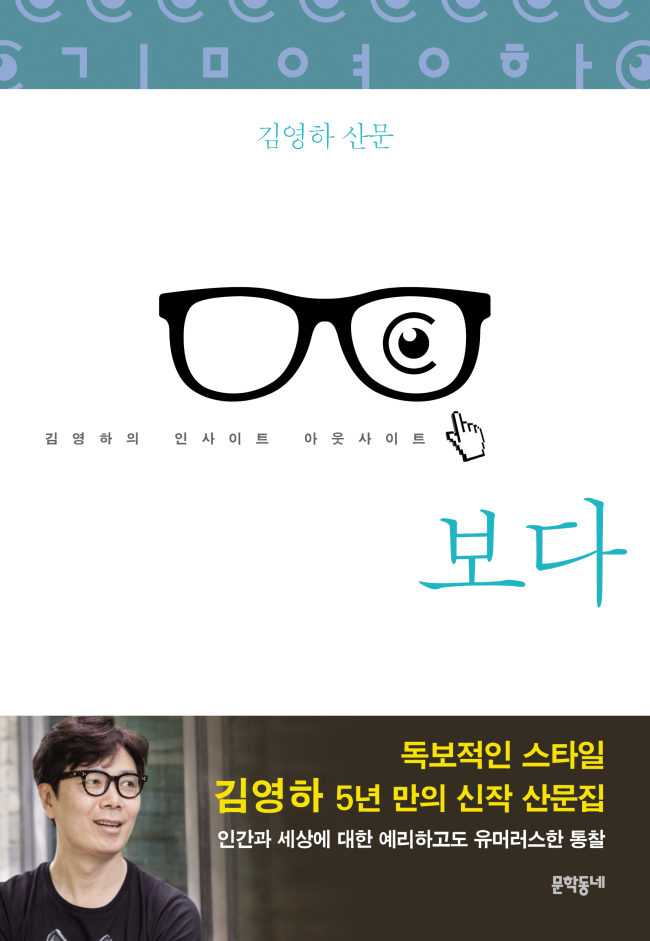Kim Young-ha probes into modern Korean society in new essay
By Korea HeraldPublished : Sept. 22, 2014 - 19:47
Kim Young-ha, one of South Korea’s most celebrated novelists of his generation, has published a book of essays titled “See,” collating his thoughts and observances of changes in Korean society since his return from New York in 2012.
The much-awaited book came five years after his previous collection of essays “Remember What You Have Lost” was published in 2009.
“I used to live like a radio station from a government in exile,” Kim wrote of his motivation for the book. “I once believed that my job as a novelist was to send messages to society, once in a while from outside.”
But when Kim returned from living in New York and Vancouver for about four years, he saw that Korea had changed drastically. “It was a different society when I returned,” continued Kim. “It was hard to pinpoint the exact changes. Not only did the street scenery change, but people’s daily lives were also different.”
The much-awaited book came five years after his previous collection of essays “Remember What You Have Lost” was published in 2009.
“I used to live like a radio station from a government in exile,” Kim wrote of his motivation for the book. “I once believed that my job as a novelist was to send messages to society, once in a while from outside.”
But when Kim returned from living in New York and Vancouver for about four years, he saw that Korea had changed drastically. “It was a different society when I returned,” continued Kim. “It was hard to pinpoint the exact changes. Not only did the street scenery change, but people’s daily lives were also different.”

It was then when the 45-year-old author felt the need to probe deeply into the society to deliver the messages properly. He decided to write what he saw, heard and experienced. The result is the 200-page-long “See.” Kim plans on publishing two more essays titled “Read” and “Say” in three-month intervals for the essay series.
Kim offers a heartfelt satire of the 21st century, through discussing various subjects based on his thoughtful observation, emphasizing the author’s relevance to everyday life. Many of his topics discuss social inequality.
The author calls the smartphone a “time thief,” stealing valuable time from the wealthy and poor alike. But the consequence shows a stark contrast. “While the poor voluntarily pay expensive smartphone charges and give their time and attention to the gadget, the rich can earn money from the same experience through buying stocks from global IT companies that offer the service, such as Samsung and Apple.”
“It is causing a polarization of time,” says the author. He then asks the readers, “How can we save our valuable time in this society?”
Kim also weaves in film and literature to explain complicated human nature and the uncertainties of life. The sci-fi film “Gravity” is connected to Epicurean philosophy to describe life and death and why people have to live to the fullest even when their life is limited. The author connects the film “Life of Pi” with the ancient Greek poem “Odyssey” to illustrate effective ways of storytelling.
Born in Hwacheon, Gangwon Province, in 1968, Kim began his writing career at age 26 with the novel “I Have the Right to Destroy Myself,” which garnered international acclaim. Since then, he has written numerous novels, including “Your Republic is Calling You” and “Black Flower,” and was also a contributing opinion writer for the International New York Times. Living currently in Busan, Kim’s work has been translated into dozens of languages including English, German and French.
By Ahn Sung-mi (sahn@heraldcorp.com)
-
Articles by Korea Herald



















![[Today’s K-pop] Treasure to publish magazine for debut anniversary](http://res.heraldm.com/phpwas/restmb_idxmake.php?idx=642&simg=/content/image/2024/07/26/20240726050551_0.jpg&u=)